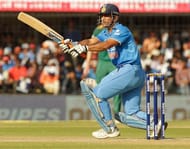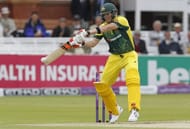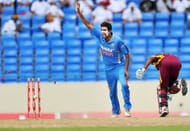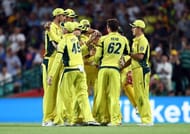
Australia will be touring India to play five ODIs and three T20s from 17 September to 13 October. This much-anticipated series guarantees terrific entertainment for the fans as both the sides are accomplished in the limited overs format.
For, India, this series is highly significant as it allows them the opportunity to fix some of the gaping holes existing in their ODI unit while for Australia, it is a chance to work on their preparations for the 2019 World Cup.
Although India will enjoy the home advantage in this series, the challenge is tough for them and hence the series is anything but a cakewalk.
These five points prove why this Australia series is a great Test for India-
#5. ODI series at home after a long time
Courtesy the 'grand home Test season' where India hosted South Africa, New Zealand, England, Bangladesh and Australia for Test matches, the cricket in India, in the last couple of years has been mostly red-ball cricket.
In 2016/17, India hosted only eight ODIs which included a five-match series against England and a three-match series against New Zealand. So far in 2017, India haven't played any ODIs at home. The ICC Champions Trophy was held in England and there were two five-games bilateral series in Sri Lanka and West Indies.
This lack of limited overs cricket in home conditions (only eight ODIs since 2016) can make a vital impact in the ODI series.
All games are day-night matches where aspects like bowling in dew and batting in the flood-lights will come into play. Although Indian bowlers have negotiated the threat of dew throughout their career, the lack of practice might make a difference.
The same can be said about batting in the lights and facing the white-ball which hasn't happened even once so far in this year at home for Indian batsmen. This small issue can create a huge difference in this series.
#4. India's issues in the batting order

Although India reached the finals of the Champions Trophy, the team still has several issues to sort out. The biggest concern is the fragile middle order. There is no confirmation on who will bat at number four.
Yuvraj Singh, who was called back in the ODI team last year to fill this slot, has performed below par and hence is being once again sidelined from the team. Ajinkya Rahane, who has been with the team for a long time, doesn't have the skipper's trust and his statistics at number four aren't all that remarkable.
KL Rahul has faced injury issues in the past and failed to deliver during the Sri Lanka series. In three innings, he scored only 28 runs and hence questions over his abilities have loomed. At the moment, Manish Pandey looks to be the best hope and his half-century in the T20I against Sri Lanka makes his case extremely strong.
The problem don't end at number four. MS Dhoni, although effective in Sri Lanka at number six, still has a few questions to answer as during that series he was rarely tested for the role which he is in the team, the role of a finisher during death overs.
Kedar Jadhav secured his place in the team with back-to-back swashbuckling and bold performances against England but since then hasn't achieved much with the bat. His role in the team is also a cause of concern.
The sensational batting form of India's top-three has protected the middle order on several occasions but the strong bowling unit of Australia, which consists of Pat Cummins and Josh Hazlewood, is capable of putting the pressure on India's middle order.
Adam Zampa's spin bowling can dry the runs in the middle overs and as Akila Dananjaya showed in Sri Lanka, it won't take much time to run through India's middle order.
The chinks in India's batting armoury can prove fatal in a crunch game against Australia.
#3. Perils of playing against a competitive side

Australia have the perfect team combination. The effective balance of their team makes them the ideal unit for the limited overs format and maybe that's why they are the current world champions.
The likes of David Warner, Aaron Finch, and Steve Smith are capable of exploding at the beginning and can easily bat out the opposition with their ability and the hunger to play long innings. The middle order has fire-power in abundance to propel the score in the death overs and although inexperienced, the bowling unit has serious talent and skills which are effective in limited overs format.
The depth of Australia's squad makes them a tough team to beat in the ODIs. India, this year, have faced mostly mediocre ODI teams. In the Champions Trophy, Bangladesh, and South Africa weren't at their best while Sri Lanka and Pakistan exposed India's weak links mercilessly.
Later in the year, India toured West Indies and Sri Lanka who have lost their mojo and are struggling for survival. In this series, India will be facing a highly competitive unit and hence it will be a challenge for the Indians to up the ante at the precise moment.
#2. The spin woes

Ravi Ashwin and Ravindra Jadeja are at the top of the bowling rankings in Test cricket but both of them have looked rusty in ODIs. Ashwin, in the recent games, has been guilty of bowling negative lines and hence has ended up wicket-less on several occasions.
Jadeja, on the other hand, hasn't been able to innovate effectively and as Sri Lanka and Pakistan showed in the Champions Trophy, milking him isn't very difficult. The ineffective bowling of India's frontline spinners has added to India's worries.
The likes of Axar Patel, Yauzuvendra Chahal, and Kuldeep Yadav have done effectively in their limited chances but they lack the experience.
Steve Smith has emerged as a master batsman against spin bowling and he can keep India's spinners at bay with his unorthodox technique. Glenn Maxwell loves depositing spinners into the stands and India's batting friendly surfaces will offer him the license to do that.
Other batsmen in Australia's squad are also efficient players of spin in the limited overs format and thus tying the visitors with spin bowling could be a gamble.
#1. No such home advantage

Eight members of Australia's 14-man squad for the India tour have played in the IPL. David Warner, Aaron Finch, Glen Maxwell, and James Faulkner have featured in India's domestic T20 league for several years and they tour India every year for around 50 days.
Thus, most of the Australian players have plenty of experience of playing in India and when they arrive for the ODI series, the conditions and the atmosphere will be familiar to them. This increases the enormity of the challenge for India.
In this series, India won't have any home advantage as players from both sides have played in the conditions for a long time.
Except for Guwahati, most of the Australian players have played cricket on all venues courtesy of the IPL. Chennai, Kolkata, Indore, Bengaluru, Ranchi, Hyderabad, and Nagpur are all familiar territories for the Aussies and thus Indians will have a tough time in 'surprising' their opponents.
Follow IPL Auction 2025 Live Updates, News & Biddings at Sportskeeda. Get the fastest updates on Mega-Auction and cricket news
